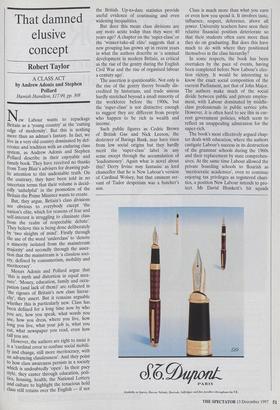That damned elusive concept
Robert Taylor
A CLASS ACT by Andrew Adonis and Stephen Pollard Hamish Hamilton, £17.99, pp. 308 N. ew Labour wants to repackage Britain as a 'young country' at the 'cutting edge of modernity'. But this is nothing more than an adman's fantasy. In fact, we live in a very old country dominated by def- erence and tradition with an enduring class system, as Andrew Adonis and Stephen Pollard describe in their enjoyable and timely book. They have received no thanks from Tony Blair's advisers for drawing pub- lic attention to this undeniable truth. On the contrary, they have been told in no uncertain terms that their volume is decid- edly 'unhelpful' in the promotion of the Britain the Prime Minister wants to create.
But, they argue, Britain's class divisions are obvious to everybody except 'the nation's elite, which for reasons of fear and self-interest is struggling to eliminate class from the realm of respectable debate'. They believe this is being done deliberately by 'two sleights of mind'. Firstly through the use of the word 'underclass' to 'denote a minority isolated from the mainstream majority' and secondly through the asser- tion that the mainstream is 'a classless soci- ety, defined by consumerism, mobility and meritocracy'. Messrs Adonis and Pollard argue that this is myth and distortion in equal mea- sure'. 'Money, education, family and occu- pation (and lack of them)' are reflected in the rigours of Britain's new class hierar- chy', they assert. But it remains arguable Whether this is particularly new. Class has been defined for a long time now by who You are, how you speak, what words you use, how you dress, where you live, how long you live, what your job is, what you cat, what newspaper you read, even how tall you are. . However, the authors are right to insist it is a 'cardinal error to confuse social mobili- ty and change, still more meritocracy, with an advancing classlessness'. And they point to how class awareness persists in a society Which is undoubtedly 'open'. In their pacy "le, they canter through education, poli- tics, housing, health, the National Lottery and culture to highlight the tenacious hold class still retains over the English — if not the British. Up-to-date statistics provide useful evidence of continuing and even widening inequalities.
But does this mean class divisions are any more acute today than they were 40 years ago? A chapter on the 'super-class' or the `winner-take-all elite' suggests that a new grouping has grown up in recent years in what the authors describe as 'a seminal development in modern Britain, as critical as the rise of the gentry during the English Civil War and the rise of organised labour a century ago'.
The assertion is questionable. Not only is the rise of the gentry theory broadly dis- credited by historians, and trade unions hardly stretched beyond a small minority of the workforce before the 1900s, but the 'super-class' is not distinctive enough to suggest they are different from people who happen to be rich in wealth and income.
Such public figures as Cedric Brown of British Gas and Nick Leeson, the destroyer of Barings Bank, may have risen from low social origins but they hardly merit the 'super-class' label in any sense except through the accumulation of `loadsamoney'. Again what is novel about this? Derry Irvine may fantasise as lord chancellor that he is New Labour's version of Cardinal Wolsey, but that eminent ser- vant of Tudor despotism was a butcher's son. Class is much more than what you earn or even how you spend it. It involves taste, influence, respect, deference, above all power. University teachers have seen their relative financial position deteriorate so that their students often earn more than they do on graduating. But does this have much to do with where they positioned themselves in the class hierarchy?
In some respects, the book has been overtaken by the pace of events, having been completed before New Labour's elec- tion victory. It would be interesting to know the exact social composition of the current Parliament, not that of John Major. The authors make much of the social divide between public and private employ- ment, with Labour dominated by middle- class professionals in public service jobs. However, it is often hard to see this in cur- rent government policies, which seem to reflect an unappealing admiration for the super-rich.
The book's most effectively argued chap- ter deals with education, where the authors castigate Labour's success in its destruction of the grammar schools during the 1960s and their replacement by state comprehen- sives. At the same time Labour allowed the private boarding schools to flourish as `meritocratic academies', even to continue enjoying tax privileges as registered chari- ties, a position New Labour intends to pro- tect. Mr David Blunkett's hit squads against poorly performing state schools in socially deprived areas may win praise from the populist press but they are a diversion from the betrayal of working-class children who are condemned, through lack of choice for their parents, to go to them. As Adonis and Pollard assert:
The comprehensive revolution tragically destroyed much of the excellent without improving the rest. Comprehensive schools have largely replaced selection by ability with selection by class and house price. For all the good intentions, the destruction of the grammar schools — in the name of equality of opportunity — only had the effect of reinforcing class divisions.
Infuriatingly, the authors draw no gener- al conclusions from their tour through 'class-ridden' Britain, let alone any pre- scriptions of what, if anything, should be done about what they found. In fact, they fail to explain why today's class divisions represent an 'alarming social reality'. They do not write enough about the 'underclass' in the inner cities.
More seriously, they overlook what is arguably the most damaging and dramatic shift in class composition we have experi- enced over the past 20 years with the col- lapse of manufacturing industry. This is the sharp decline in skilled manual work avail- able for men following the closing of ship- yards, factories and pits. The resulting disintegration of the 'respectable' working class is the most alarming phenomenon in Post-industrial society. The breakdown of family life, the disorder on our streets, the self-destructiveness of the drug/alcohol cul- ture among the young, the lack of regard for the old, the material and moral poverty on many housing estates, all stem from this almost unnoticed social trend. The decline of the once highly influential labour aris- tocracy has been the saddest consequence of de-industrialisation and the arrival of so- called modernity. But it is highly questionable whether Britain differs in the consequences of its class divisions from other western societies going through similar social change. The authors ought to have looked at our specif- ic problem with a more comparative analy- sis. The United States, for instance, always claims to be a classless society but its rugged individualism and melting-pot of races are the stuff of potent myth. That country's social divisions are often much starker than our own. France also remains a stuffy, hidebound, class-dominated society. Compare life in working-class St Denis with the bourgeois Etoile district of Paris.
This goes to show how the concept of class remains elusive. What may be more crucial than objective social differences based on wealth, income or even lifestyle is Class consciousness as opposed to class con- flict. In Britain we have never really fought the class war. Around a third of the manual Working class has voted for the Conserva- tive party since they were franchised. Most people accept and tolerate our bewildering variety of class differences with humour and stoicism. They may recognise the 'them' and 'us' divide but they have learned to live with it. Perhaps they should not have done. But then the British Left has always failed hopelessly to change popular attitudes towards class. That old Etonian and socialist George Orwell once observed: 'England is the most class-ridden country under the sun.' And as this book amply demonstrates, it still is, whatever the Fettes- and Oxford-educated Mr Blair may think.
Robert Taylor writes for the Financial Times.



















































































 Previous page
Previous page